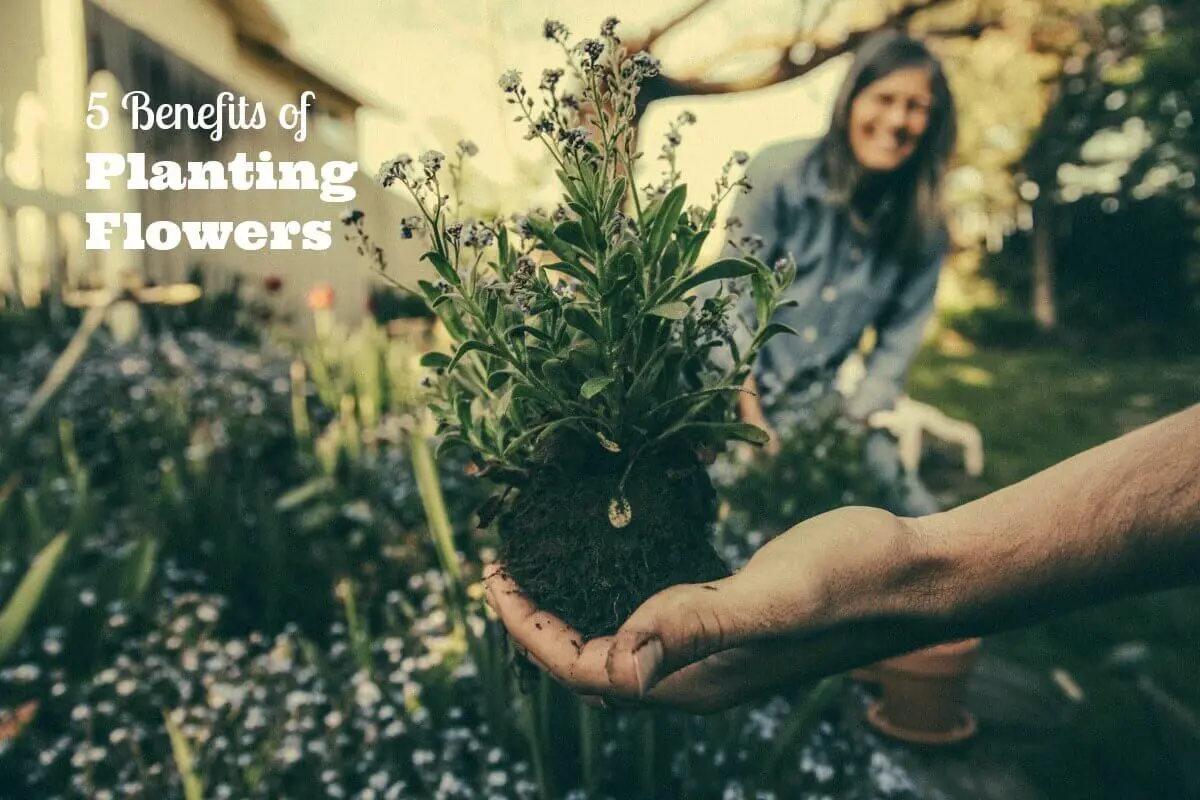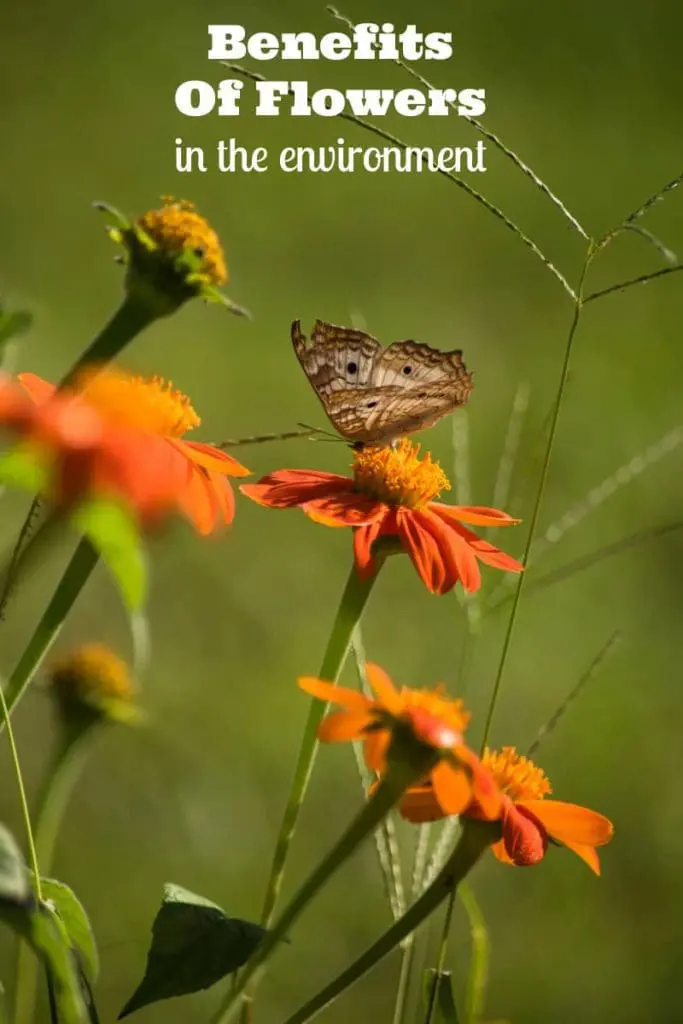The growing season is upon us. Did you know that the simple act of planting, tending, and growing flowers can have minor and major benefits to every family? With just a bit of soil, seeds, and perseverance you can obtain the educational, social, environmental, and health benefits of planting flowers. I loved to help my grandmother in the garden as a child. I have many fond memories of gardening with her and playing in the garden on my own. From the benefits of flowers in the environment to the benefits of learning to grow, flower gardening is very rewarding. In fact, growing your own flower garden can have a positive effect on both your mental health and physical health.
5 Fabulous Benefits of Planting Flowers At Home

1. Benefits Of Flowers In The Environment
You may be wondering, “How do flowers help the environment?” Well, planting flowers will not halt the rate at which our environment is deteriorating, but it will have a positive impact. Today carbon dioxide levels are at an all-time high. Despite that, people are bound to their gasoline vehicles by necessity. By planting flowers, people can lower their carbon footprint by supplying the environment with more plants that can consume more carbon dioxide. Through the process of photosynthesis, the oxygen supply is then replenished a bit. Additionally, flowering plants can help filter toxins out of the air and improve the air quality we breathe.
The environmental design of Mother Nature relies on enough flowers to help propagate the species. The number of plants and different flowers play an important role in creating the ideal conditions all the elements of nature need. This includes important pollinators to flourish. Flowers attract butterflies, bees, and other insects to pollinate plants and allow them all to keep replacing themselves.
The importance of flowers to the natural environment is also in their interaction with the ground. Flowering plants help improve the quality of soil, conserve water, and minimize erosion. Native flowers are a great way to improve green spaces.
The birds and the bees will certainly see the benefits of flowers in the environment. Flowers are a great source of nutrients for bees and hummingbirds. Flowers go to seed and birds sometimes can eat those berries. One of the benefits of flowering plants is encouraging a more diverse ecosystem.

2. Educational Planting Flowers Benefits
Whether your flower gardening routine is a solo or group activity, there are educational benefits of planting flowers.
Solo: Gardening as a solo activity requires a lot of research and a bit of flying blind. The internet—one of the main sources of secondary knowledge—can only teach so much. Despite that deficiency people who are solo gardeners can engage in real life problem solving throughout the gardening process.
Group: When gardening with kids, knowledge can be shared and lessons can be passed from one generation to another. Old hats at gardening can gain new insights by observing the young and inexperienced at work. Newcomers can provide open minds. They can learn knowledge from multiple teachers (internet, older gardeners, and his or her own experiences).

3. Health Benefits of Growing Flowers
Gardening flowers provides numerous health benefits by providing opportunities to strengthen the body.
Due to the sedentary nature of many jobs and hobbies, the amount of physical activity that people get weekly is way below the amount recommended by the Center for Disease Control. Adults should exercise at least 2 hours and 30 minutes a week. Children should have at least 1 hour a day of physical activity. Planting, weeding and watering plants all require some degree of daily physical activity. Keeping to a weekly workout regime prolongs life by fighting disease and strengthening muscles and bones. Gardening will allow people to achieve most of their weekly physical activity quota.
Another side effect of today’s sedentary lifestyle is the unnaturally pale skin and a disturbingly low amount of Vitamin D in the body. Vitamin D enters the body when ultraviolet radiation touches the skin. Vitamin D is necessary for children and adults to absorb calcium. Without Vitamin D, all that milk that you force yourself and your kids to drink is useless. Without the Vitamin D produced when you engage in outside activities like gardening, your family will have weak bones and teeth and disturbingly high dentist and doctor’s bills.
You may also enjoy the therapeutic effect of uplifting natural scents and colorful shapes.
4. Social Benefits of Flower Gardening
Growing a flower garden as a group project with encourage social interactions and facilitate intimate connections. Working together to make a better place is a natural way to get activity and converse at same time.
When gardening is engaged in as a group activity with other family members or friends, gardeners will see an improvement in the social aspect of their lives. In an age where family activities include sitting mindlessly in front of the television or video game screen, gardening is a fun and educational group activity. As the season passes and the plants begin to bloom, you might also notice a strengthening of family ties. This is partly because, during gardening, you are not disengaging with each other. Instead, you are working together to achieve a common goal.

5. Beauty And Joy
This may seem obvious but fresh flowers are beautiful. They can bring you and all who see them joy. Planting flowers will make your yard beautiful for the whole neighborhood to enjoy. You can also cut the flowers and make bouquets for the special people you love. From special occasions to a simple surprise, a floral arrangement is sure to bring positive emotion. It can even help lower stress levels for the recipient and the giver. Fresh cut flowers are an easy way to make someone’s day! In fact, their positive energy is why they are often given to hospital patients to brighten their day and spread cheer.
If you aren’t convinced by anecdotes alone, research at Rutgers University showed study participants found flowers may be potent mood elevators. In several double-blind studies, all recipients responded to the flower arrangements with a “true smile” involving the mouth, cheeks, and eyes. “And three days later, the flower recipients were still feeling happier than their cohorts in the study.” I know it works for me. Flowers always fill me with positive energy.
Conclusion
Planting flowers offers countless benefits that go far beyond their vibrant colors and beautiful blooms. In a community garden, early spring plantings of annual flowers and native plants not only add aesthetic appeal but also help prevent soil erosion and support local ecosystems. These blossoms attract beneficial insects like bees and butterflies, which are essential for pollination. By choosing the right mix of flowers, we can create spaces that are both visually stunning and ecologically supportive, turning our gardens into lively, purposeful environments that bring people together and brighten our surroundings.
Benefits of planting flowers can be a fun and satisfying social activity. It can be used to stretch the mind and as a family bonding time. As the plants grow, the body is strengthened. By the time the flowers are in bloom, you might find yourself wondering “why didn’t I do this earlier?” You will also be happy to know of the benefits of flowers in the environment. You will feel good doing a little something good for the environment. Do you think you will try a flower garden this year? What do you think will be your favorite benefits of planting flowers?
Related Posts:

HilLesha @To the Motherhood says
Great post! I love gardening. 🙂 One more benefit is that some flowers, like those in a vegetable garden, can also be a food source for people!
Darlene says
Great article on importance of planting flowers!
Gardening has so many benefits, with the biggest benefit for me being stress management and natural stress relief. Being out and about in the garden is relaxing, watching the flowers and plants grow is rewarding, and sharing the beauty and produce of your garden with friends and family is very satisfying. Gardening is simply the perfect anti-dote for the stresses of modern-day living!
sean says
Great tips about the benefits of flowering plants! It is funny but just the other day heard about the importance of planting flowers in school compound for children to learn about how things grow and make seeds. I’m about to start my own garden soon! I love your blog.
Martha says
Hi,
What a lovely post on the importance of flowers in the environment! Flowers truly play a crucial role in supporting the environment. One of the top reasons to add them to any outdoor space is their vital contribution to the process of pollination. They attract honey bees and other pollinators, which in turn help plants grow, breed, and produce food. Plus, flowers offer food and shelter for local wildlife, making our gardens not just beautiful but also ecologically important. It’s amazing how something so simple can have such a powerful impact!
Thanks for a very nice post on the benefits of growing a flower garden.
Diligence Certifications says
Planting flowers isn’t just about beautifying a space — it’s a wonderful way to support pollinators like bees and butterflies, improve air quality, and even boost your own mental well-being. There’s something truly magical about watching a garden come to life with color and movement. It’s nature’s therapy, right in your backyard!
Vera says
Flower gardening is such a beautiful way to nurture both nature and the soul! Such a great reminder of why planting flowers matters! Flowers aren’t just pretty—they support productive gardens by attracting pollinators and helping complete the life cycle of many living things. Using them as ground cover also helps protect the soil and makes any space feel more alive and welcoming. Whether you have a lot of plants or just a few, flowers can really transform an area into a beautiful garden that supports nature and lifts your mood!
Priya Basu says
This article brought back so many fond memories! I completely agree that flower gardening offers more than just a beautiful yard—it’s a powerful way to reconnect with nature, boost mental clarity, and foster community. At velocity Express, https://velexp.com, where we emphasize green solutions across various industries. The more we can all contribute—whether through a flowerbed or conscious logistics—the better for our environment.
NRIWINGS says
Lovely post! Planting flowers not only brightens up any space but also brings so many environmental and emotional benefits. Truly inspiring!
Kidzonia says
Absolutely loved this post! I started planting flowers in my small balcony garden last year, and the difference it’s made to my mood is incredible.
Diligence Certifications says
Planting flowers offers so many beautiful benefits beyond just adding color to your garden. Not only do flowers enhance the aesthetic appeal of any space, but they also support local ecosystems by attracting pollinators like bees and butterflies. Plus, gardening has proven mental health benefits—it reduces stress and brings a sense of peace and accomplishment. Whether you’re growing them in a backyard, balcony, or windowsill, planting flowers is a simple yet powerful way to connect with nature and boost overall well-being.